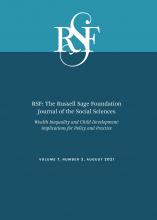Research Article
Open Access
Wealth and Child Development: Differences in Associations by Family Income and Developmental Stage
Portia Miller, Tamara Podvysotska, Laura Betancur, Elizabeth Votruba-Drzal
RSF: The Russell Sage Foundation Journal of the Social Sciences August 2021, 7 (3) 154-174; DOI: https://doi.org/10.7758/RSF.2021.7.3.07
Portia Miller
aResearch associate in the Learning Research and Development Center at the University of Pittsburgh, United States
Tamara Podvysotska
bDoctoral candidate in the Department of Psychology at the University of Pittsburgh, United States
Laura Betancur
cPostdoctoral research associate at the Department of Human Development and Family Studies, Iowa State University, United States
Elizabeth Votruba-Drzal
dProfessor of psychology and a research scientist in the Learning Research and Development Center at the University of Pittsburgh, United States

REFERENCES
- ↵
- Akee, Randall KQ,
- William E. Copeland,
- Gordon Keeler,
- Adrian Angold, and
- E. Jane Costello
- ↵
- Baker, Paula, C.
- Canada K. Keck,
- Frank L. Mott,
- Stephen V. Quinlan
- ↵
- Becker, Gary S
- ↵
- Berger, Lawrence M., and
- Jason N. Houle
- ↵
- Blair, Clancy, and
- Cybele Raver
- ↵
- Blau, David M
- ↵
- Bourdieu, Pierre, and
- Jean-Claude Passeron
- ↵
- Brotman, Laurie Miller,
- Colleen R. O’Neal,
- Keng-Yen Huang,
- Kathleen Kiely Gouley,
- Amanda Rosenfelt, and
- Patrick E. Shrout
- ↵
- ↵
- ↵
- Center for Human Resource Research
- ↵
- Chazan-Cohen, Rachel,
- Helen Raikes,
- Jeanne Brooks-Gunn,
- Catherine Ayoub,
- Barbara Alexander Pan,
- Ellen E. Kisker,
- Lori Roggman, and
- Allison Sidle Fuligni
- ↵
- Conger, Rand D.,
- Xiaojia Ge,
- Glen H. Elder Jr..,
- Frederick O. Lorenz, and
- Ronald L. Simons
- ↵
- Conley, Dalton
- ↵
- Conley, David T
- ↵
- ↵
- Covay, Elizabeth, and
- William Carbonaro
- ↵
- Diemer, Matthew A.,
- Aixa. D. Marchand, and
- Rashmita S. Mistry
- ↵
- ↵
- Duncan, Greg J.,
- Chantelle J. Dowsett,
- Amy Claessens,
- Katherine Magnuson,
- Aletha C. Huston,
- Pamela Klebanov,
- Linda S. Pagani,
- Leon Feinstein,
- Mimi Engel,
- Jeanne Brooks-Gunn,
- Holly Sexton, and
- Kathryn Duckworth
- ↵
- Duncan, Greg J., and
- Katherine Magnuson
- ↵
- Dunn, Lucia F., and
- Ida A. Mirzaie
- ↵
- Easton-Brooks, Donald, and
- Alan Davis
- ↵
- ↵
- Evans, Gary W.,
- Carrie Gonnella,
- Lyscha A. Marcynyszyn,
- Lauren Gentile, and
- Nicholas Salpekar
- ↵
- Farah, Martha J.,
- Laura Betancourt,
- David M. Shera,
- Jessica H. Savage,
- Joan M. Giannetta,
- Nancy L. Brodsky,
- Elsa K. Malmud, and
- Hallam Hurt
- ↵
- Ford, Karly Sarita, and
- Jason Thompson
- ↵
- Garcia, Emma
- ↵
- Gennetian, Lisa A., and
- Cynthia Miller
- ↵
- Gershoff, Elizabeth T.,
- J. Lawrence Aber,
- C. Cybele Raver, and
- Mary Clare Lennon
- ↵
- ↵
- ↵
- ↵
- Hardy, Bradley
- ↵
- Heberle, Amy E., and
- Alice S. Carter
- ↵
- ↵
- Henry, Daphne A.,
- Elizabeth Votruba-Drzal, and
- Portia Miller
- ↵
- Hill, Heather D.,
- Pamela Morris,
- Lisa A. Gennetian,
- Sharon Wolf, and
- Carly Tubbs
- ↵
- Karagiannaki, Eleni
- ↵
- ↵
- Lê-Scherban, Félice,
- Allison B. Brenner, and
- Robert F. Schoeni
- ↵
- Lewis, Michael, and
- Karen D. Rudolph
- ↵
- ↵
- Magnuson, Katherine A., and
- Elizabeth Votruba-Drzal
- ↵
- Markwardt, Frederick C
- ↵
- Mayer, Susan
- ↵
- Metsäpelto, Riitta-Leena, and
- Lea Pulkkinen
- ↵
- Miller, Portia,
- Laura Betancur,
- Kendra Whitfield, and
- Elizabeth Votruba-Drzal
- ↵
- Miller, Portia,
- Daphne Henry, and
- Elizabeth Votruba-Drzal
- ↵
- Miller, Portia, and
- Elizabeth Votruba-Drzal
- ↵
- Nepomnyaschy, Lenna,
- Allison Dwyer Emory,
- Kasey J. Eickmeyer,
- Maureen R. Waller, and
- Daniel P. Miller
- ↵
- Oliver, Melvin L., and
- Thomas M. Shapiro
- ↵
- Orr, Amy J
- ↵
- ↵
- Peterson, James L., and
- Nicholas Zill
- ↵
- Pfeffer, Fabian T
- ↵
- ↵
- Phillips, Meredith,
- Jeanne Brooks-Gunn,
- Greg J. Duncan,
- Pamela Klebanov, and
- Jonathan Crane
- ↵
- Rauscher, Emily, and
- William Elliott
- ↵
- ↵
- Reardon, Sean F
- ↵
- Royston, Patrick
- ↵
- Saez, Emmanuel
- ↵
- ↵
- ↵
- Shapiro, Thomas M
- ↵
- Shaw, Daniel S.,
- Elizabeth B. Owens,
- Joyce Giovannelli, and
- Emily B. Winslow
- ↵
- ↵
- ↵
- Wadsworth, Martha E.,
- Gary W. Evans,
- Kathryn Grant,
- Jocelyn S. Carter, and
- Sophia Duffy
- ↵
- ↵
- Wolff, Edward N
- ↵
- ↵
- Yeung, W. Jean, and
- Dalton Conley
- ↵
- ↵
- ↵
- Zhan, Min, and
- Michael Sherraden
In this issue
Wealth and Child Development: Differences in Associations by Family Income and Developmental Stage
Portia Miller, Tamara Podvysotska, Laura Betancur, Elizabeth Votruba-Drzal
RSF: The Russell Sage Foundation Journal of the Social Sciences Aug 2021, 7 (3) 154-174; DOI: 10.7758/RSF.2021.7.3.07
Jump to section
Related Articles
- No related articles found.
Cited By...
- No citing articles found.





